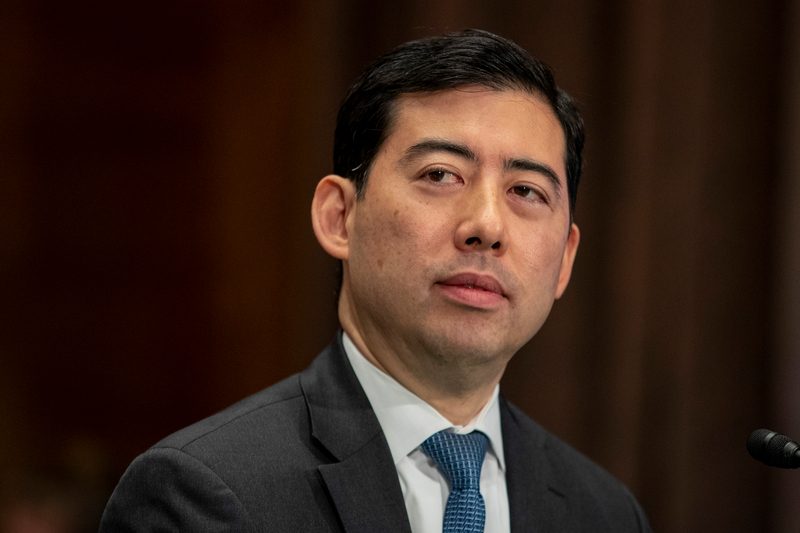Accounting firm BF Borgers has been charged by the SEC with widespread fraud affecting more than 1,500 filings.
BF Borgers agreed to pay a $12m civil penalty, and its sole audit partner, Benjamin F Borgers agreed to pay $2m, to settle the SEC’s charges. They also agreed to permanent suspensions from practicing as accountants on SEC filings, effective immediately.
BF Borges is Trump Media & Technology Group’s independent accounting firm (it was listed as its auditor as of last month in an SEC filing), but the SEC has made no allegations of wrongdoing against Trump Media. And Trump Media noted in an SEC filing on Monday it had severed ties with the audit firm.
The firm had 350 clients during this time period subject to SEC rules, many of them fintech and crypto companies, and many other small issuers, SEC filings show.
Issuer disclosure and reporting obligations
The charges against the firm and Mr Borgers include the following, as noted in the SEC’s order:
- deliberately and systematically failing to conduct audits and quarterly reviews in accordance with applicable Public Company Accounting Oversight Board (“PCAOB”) standards;
- fraudulently issuing audit reports that falsely represented that audits had been performed in accordance with PCAOB standards; and
- causing audit clients to violate certain provisions of the Exchange Act and rules thereunder, including Exchange Act Sections 13(a) and 15(d).
According to the SEC, Borgers did not properly prepare and maintain audit documentation, fabricated audit planning meetings, and in some cases simply passed off previous audits for the current audit period.
Of 369 BF Borgers clients whose filings from January 2021 through June 2023 incorporated BF Borgers’ audits and reviews, at least 75% incorporated audits that did not comply with the SEC’s rules.
The order states that it “denies BF Borgers the privilege of appearing or practicing before the Commission as an accountant.”
As a result, BF Borgers may not participate in or perform the audit or review of financial information included in Commission filings, issue audit reports included in SEC filings, provide consents with respect to audit reports, or otherwise appear or practice before the SEC.
SEC staff statement on impact on businesses
“Ben Borgers and his audit firm, BF Borgers, were responsible for one of the largest wholesale failures by gatekeepers in our financial markets,” said Gurbir Grewal, Director of the SEC’s Division of Enforcement, in a statement.
“Because investors rely on the audited financial statements of public companies when making their investment decisions, the accountants and accounting firms that audit those statements play a critical role in our financial markets. Borgers and his firm completely abandoned that role, but thanks to the painstaking work of the SEC staff, Borgers and his sham audit mill have been permanently shut down,” Grewal stated.
In a staff statement accompanying its order, the SEC acknowledged that a significant number of issuers have engaged BF Borgers to audit or review financial information contained in their Commission filings and will be affected by its order.
“We encourage all issuers that have previously engaged BF Borgers as their independent auditor to consider the findings and sanctions discussed in the order, taking into account their disclosure obligations under the federal securities laws,” the SEC said.
To that end, the SEC provided a helpful list of action items for registrants that had employed BF Borgers to take in terms of SEC filings and offering and registration statements.
The importance of the auditors
Regulatory agency officials at the Public Company Accounting Oversight Board and SEC have repeatedly stressed the importance of the auditor’s role in maintaining trust and confidence in the capital markets in their unique gatekeeper function.
Paul Munter, the SEC’s chief accountant, has addressed this issue pointedly, calling on audit forms to update their risk assessments, which form the basis of the audit process. “A lack of professional skepticism, including objective consideration of contradictory information, in this critical process could result in an auditor not identifying or assessing risks appropriately, which could impact the effectiveness of the audit,” he said.
And SEC Chair Gary Gensler has noted: “There’s a basic bargain in our capital markets: investors get to decide what risks they wish to take” while “companies that are raising money from the public have an obligation to share information with investors on a regular basis.”
The timely and transparent reporting by management, and informative, accurate, and independent reports by auditors, are critical components of the system that help companies maintain their end of the bargain, Gensler noted.
Because auditors serve as an independent check on management’s performance of critical functions and a business’s financial soundness, the scrutiny of them – from their ability to perform their role objectively, to their reporting obligations, to their ethical behavior in the workplace – is unlikely to diminish soon.













